Tooltester is supported by readers like yourself. We may earn an affiliate commission when you purchase through our links, which enables us to offer our research for free.
I still remember the first time I was looking for a cheap web host: all these competing online offers came up and I didn’t know which one to go for. I took ages to decide and in the end, I didn’t really choose well.
Concepts like databases, bandwidth, maximum inodes and FTP accounts really confused me. I also had no clue about their performance and which provider was trustworthy.
Luckily, after a couple of mistakes (please, don’t ever sign up with Strato!), I found a couple of reliable cheap web hosting providers I was pleased with.
To help you choose better than I did, I gathered all my findings in this guide. Let’s look at (the best) cheap web hosting for your project. Shall we?
Smart Finder: The 1 minute quiz to find the right web hosting for you!
Check out our Smart Finder and find out what is the best option to host your website in just 1 minute.
Affordable Web Hosting Overview Table
| # | Provider | Prices | Comment |
|---|---|---|---|
| 1 | Try for free |
From $9.59 to $19.99 a monthR | Hostinger offers great value for your money as an affordable web host. It’s got a user-friendly panel loaded with features like staging and backups, making it super easy to use. |
| 2 | Try for free |
From $17.99 to $44.99 a month | Great web hosting service that comes with helpful customer support and cool extras like staging areas and a built-in CDN. The downside? It’s a bit pricey and might not fit everyone’s budget. |
| 3 | Try for free |
From $6.99 to $12.99 a month | Best value for your money. Good performance and reliable customer support. |
| 4 | 
Try for free |
From $10.99 to $25.99 a month | Comes with WordPress-focused features. Good speed and uptime. Data centers in Asia, Europe and America. |
| 5 | 
Try for free |
From $10.95 to $25.95 a month | Reliable performance with a green heart. |
| 6 | Try for free |
From $10 to $200+ a month | Good performance and easily scalable. |
| 7 | Try for free |
From $4.07 to $9.57 a month | WordPress only, decent performance and affordable. |
| 8 | 
Try for free |
From $9.99 to $34.99 a month | Speed and uptime are OKish. Windows hosting plans available. May need separate add-ons for features like SSL or backups. |
| 9 | 
Try for free |
From $8.95 to $16.95 a month | Speed should be improved. Aggressive upsell pitches and questionable customer support. |
| 10 | 
Try for free |
From $6.99 to $19.99 a month | Should improve the speed, uptime is good. Pushy upgrades and upsells. |
| 11 | 
Try for free |
From $9.99 to $24.99 a month | Simple web hosting and good customer support. Disappointing performance. |
| 12 | 
Try for free |
From $4 to $14 a month | Hard to deal with their customer center – too many upsells and hidden fees. IMO, performance wasn’t satisfactory. |
| 13 | 
Try for free |
$8.99 a month | Terrible performance and customer support. Missing basic features (e.g. backups). |
| 14 | |
From $3.99 to $6.99 a month | Cheap web hosting but performance and customer support make it a difficult choice. |
Note: the above prices are for 1-year deals after renewal. Some providers may offer juicy discounts during the first term. Check this Website Hosting Comparison tool for more information.
What To Expect From a Cheap Hosting Provider
Before I dive into what each web host offers and tell you all about their pros and cons, let me explain to you what affordable web hosting providers normally offer.
There are several types of web hosting (e.g. VPS, cloud, or dedicated hosting), but the most economical one is shared web hosting. It’s called shared because you share a server (and its resources) with other clients (websites). Similar to co-living in a flat, your rent will be cheaper but you may need to wait longer to access the shower.

Linux and Windows are the two favourite operating systems among web hosting servers – Linux being the most popular one and the one you most likely need (e.g. to use PHP and WordPress). But some providers also offer Windows-based web hosting (e.g. to use Microsoft’s ASP.net). MySQL is normally the default database management system.
One way or another, a domain name will be given. Most providers will offer a free domain name for the first year (e.g. Bluehost), after that you’ll be prompted to pay for your domain name. Generally speaking, domain name registrars like Namecheap have better rates.
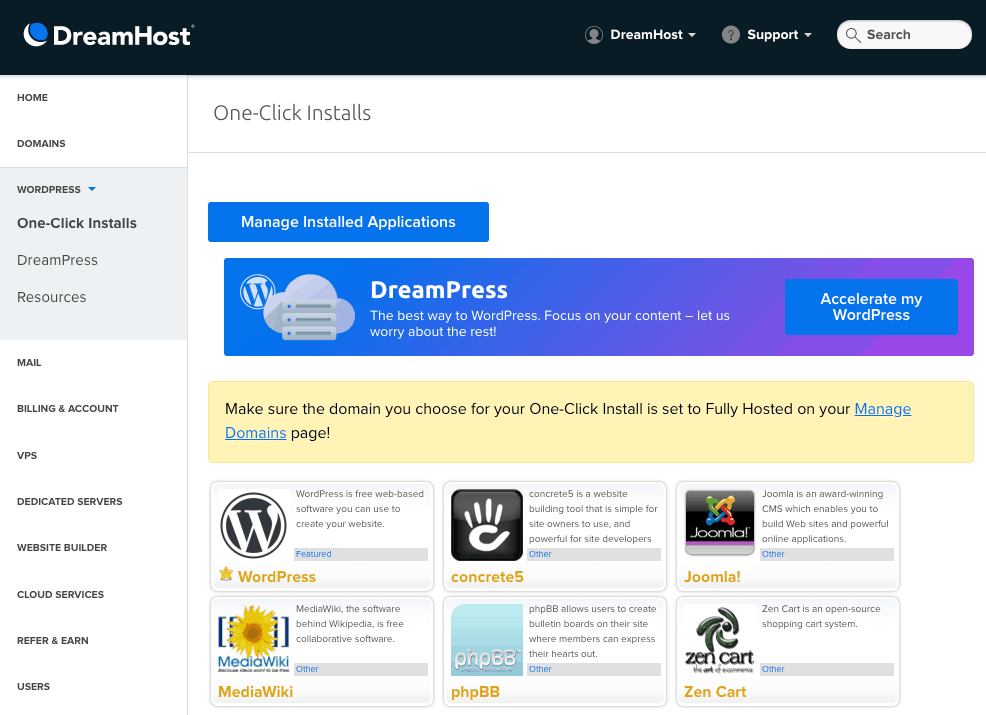
All web hosting providers come with a control panel where you can manage your settings (e.g. choosing a PHP version) and access the hosting features (e.g. backups). Most affordable web hosting plans use cPanel as a visual interface to manage your web hosting. However, others like DreamHost have their own solutions (previous screenshot).
Every web host will have some kind of customer support, as we’ll see later on, this is a crucial aspect when choosing a hosting provider as it can save time and money.
There are many types of cheap shared web hosting services, but you can expect to pay between $6 to $30 a month after renewal – big discounts are often offered during the first term.
Top Cheap Web Hosting Providers
Low-cost web hosting providers are great but only if they provide good service. Hence, pricing is not the only factor I evaluated to create this list of top cheap website hosting services.
SiteGround
This Bulgarian provider launched its web hosting services back in 2004. SiteGround has more than 400 employees and hosts over 2 million domain names.
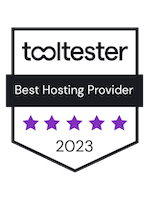 I am really impressed with their product (performance, support and features), and we’ve been using them for a couple of our own projects here at Tooltester.
I am really impressed with their product (performance, support and features), and we’ve been using them for a couple of our own projects here at Tooltester.
In fact, I think they are the best cheap web hosting provider, which is why we awarded them our badge for 2023!
They are a bit more expensive than average – but the quality also increases.
SiteGround Prices
- StartUp: $17.99 a month for 10 GB of storage and 1 website.
- GrowBig: $29.99 a month for 20 GB of storage and unlimited sites.
- GoGeek: $44.99 a month for 40 GB of storage, unlimited sites and higher performance.
The above prices reference 1-year deals, but be aware that the full amount needs to be paid in advance. On top of 12-months deals, you can also purchase 24-months and 36-months deals. SiteGround offers incredible discounts for the first purchase term – around 3x cheaper. So it might be a good idea to lock in the lower rate as long as possible.
SiteGround Pros
- Easy to use: I find their control panel logically structured and intuitive.
- Performance: SiteGround’s speed and uptime records are excellent as you can see in our tests.
- Support: Most of my experience with SiteGround’s support agents have been (very) positive.
- Cutting-edge features: I love some of their most advanced features. For instance: their on-demand backup system, speed optimization plugins, easy-to-create (and deploy) staging areas and pre-installed Git repositories.
- Server location: Choose to host your website in the US, Europe (Amsterdam, Frankfurt or London), Asia (Singapore) and Australia.
- CDN (Content Delivery Network): Not only do they offer a built-in solution, but even better is the direct integration with Cloudflare.
SiteGround Cons
- Prices: They aren’t the cheapest hosting provider on this list, you’ll need a decent budget.
- Not unlimited storage: Even if they are very generous with the offered storage, this isn’t unlimited.
- Migration plugin: Although the support team always helped me, I had several issues with their WordPress migration plugin.
Who should use SiteGround?
Anyone who wants the best quality web hosting and is happy to pay a bit more. I think it’s a good match for hosting-critical projects like avid bloggers or digital agencies. If you are a developer, SiteGround’s advanced features may make your life easier. WordPress developers will find its features like staging areas interesting. But be aware of the allowed website limitation.
> Read the full SiteGround review
Try SiteGround: www.siteground.com
DreamHost
I am really impressed by this Los Angeles based web hosting provider. DreamHost has been around since 1996 and it currently hosts over 1.5 million websites.
They offer a rounded hosting service that’s suitable for beginners and larger projects. On top of that, their products have a fair price.
DreamHost Prices
- Shared Starter: $6.99 a month for 1 website. Email is paid separately starting at $19.95 per year.
- Shared Unlimited: $12.99 a month for unlimited sites, storage and email accounts.
The above prices are for 1-year deals, and you can purchase monthly and 3-year plans too. Unlike other web hosting providers, DreamHost won’t do cheaper offers for the first term of your purchase.
DreamHost Pros
- Performance: Reasonable results in our speed and reliability tests.
- Truly unlimited: Unlike many of their competitors they don’t sneakily use inodes to cap the storage you can have.
- 97-day money back policy: If after 97 days you aren’t happy with their services, you can claim your money back.
- Support: I only had good experiences with their 24/7 support.
- Affordable: DreamHost shared web hosting is one of the cheapest.
DreamHost Cons
- Missing 1-click installations: Oddly, their control panel only comes with 1-click installations for a few CMSs like WordPress or Zen Cart.
- Only US-location servers: They only have servers in the US, this may not be ideal for you if the bulk of your traffic is located elsewhere (e.g. Europe).
- Entry-level email accounts paid separately: If you need email accounts with the Starter plan, those are paid separately ($19.95 a year).
- Missing advanced features: Even if DreamHost is good enough to host really big sites, some advanced features those sites may need are not offered. For example, no staging areas, server-side caching or a cutting edge backup system. However, these features are available on the more expensive, DreamPress managed WordPress plans.
Who should use DreamHost?
If the bulk of your traffic comes from North America and you want a web hosting provider that offers great value for your money, DreamHost is your best option.
> Read the full DreamHost review
Try DreamHost: www.dreamhost.com
A2 Hosting
A2 Hosting has been around since 2001 and even if it’s not as popular as other web hosting providers like GoDaddy or Bluehost, it has a relevant market share. They claim that 97% of their customers are satisfied with their service and promise to have 20x faster servers.
A2 Hosting Prices
- Startup: $10.99 a month for 1 website and 100 GB of storage.
- Drive: $12.99 a month for unlimited sites. Backup and restore features added.
- Turbo Boost: $20.99 a month for all Drive features plus HTTP/2 and speed optimization options (e.g. WordPress and Magento plugins).
- Turbo Max: $25.99 for more performance.
The above-mentioned prices are for 12-months deals at renewal, be advised that the full contracted amount needs to be paid in advance. On top of 1-year deals, you can purchase monthly, 24-months and 36-months deals.
A2 Hosting Pros
- Performance: In my speed and reliability tests, A2 Hosting provides faster than average loading times and great uptime rates.
- Advanced features: Just like SiteGround, A2 offers a good range of advanced features (e.g. staging areas or caching systems).
- Server locations: you can choose to host your website in the US (West and East Coast), Asia or Europe.
- No storage and bandwidth limitations: A2 Hosting won’t measure the traffic and won’t limit your web storage either.
A2 Hosting Cons
- Confusing purchase process: Their check out is packed with add-ons and upsell suggestions you most likely won’t need.
- Limited to 35 HTTP connections: The concurrent HTTP connections your site can get are limited to 35 (although usually that’s more than enough).
- On-demand backups: are limited to the cPanel tool, which is not the easiest to use.
Who is A2 Hosting for?
Since their prices are affordable and they come with advanced web hosting options, it may be suitable for those looking for a (cheaper) SiteGround alternative. However, be aware that SiteGround offers a bit more.
> Read the full A2 Hosting review
Try A2 Hosting: www.a2hosting.com
GreenGeeks
GreenGeeks aren’t the most popular web hosting provider you’ll find, but 50,000 customers trust their websites, and they’ve already been around for over a decade. More than half a million websites are hosted using their green-energy powered hosting.
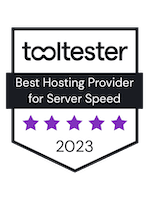
But besides caring about the environment, I have to say that GreenGeeks web hosting is not bad at all; it was the fastest web host in our most recent tests.
We even awarded it our Best Hosting Provider for Server Speed award for 2023!
But how much does it cost? Let me tell you about its prices.
GreenGeeks Prices
- Ecosite Lite: $10.95 a month for 1 website unlimited storage (150,000 inodes) and 1 GB of RAM.
- Ecosite Pro: $15.95 a month for unlimited sites and storage (300,000 inodes max.) and 2 GB of RAM.
- Ecosite Premium: $25.95 a month for unlimited sites and storage (500,000 inodes max.) and 3 GB of RAM.
The above prices are for the shared GreenGeeks web hosting plans when renewing your account for a 12-month deal.
GreenGeeks Pros
- Green soul: This web hosting provider is trying to make a difference by using renewable energy sources only.
- Server locations: You can choose to host your site in a Canadian, American or European data-center.
- Bandwidth: GreenGeeks doesn’t limit the monthly traffic that your site can get.
- Storage: All GreenGeeks’ plans come with unlimited storage. Be aware that as with many other hosts there is an inode limitation for each plan (inodes equals the number of total files in your account).
- Performance: The uptime and loading speed are absolutely reliable according to our tests (read below).
GreenGeeks Cons
- User management: There aren’t any options to add additional users to your hosting account. This can be a deal-breaker for teams and agencies.
- 1 free backup restore: The first backup you restore in a given month is free, after that, you’ll be requested to pay a fee.
- Design: I would say that it’s easy enough to use, but its backend could look a bit more modern.
- Advanced features: Developers may miss important features like staging areas or premium DNSs.
Who is GreenGeeks for?
GreenGeeks is a reliable web host for small to medium projects. It’s perfect for small bloggers and businesses that are looking for solid web hosting. The green-energy approach is a bonus.
> Read the full GreenGeeks review
Try GreenGeeks: www.greengeeks.com
Cloudways
Cloudways is a fast-growing web hosting provider that has a different approach than most of its competitors. They are a cloud solution that will allow you to pick the infrastructure you’d like your site to be hosted with (e.g. DigitalOcean, AWS, Google Cloud, etc.).
With Cloudways you can spend hundreds a month on web hosting, but surprisingly, they also offer affordable cloud hosting for the smaller websites, which starts at $10 a month.
Cloudways Prices (Digital Ocean servers)
- Entry: $10 a month for 25 GB of webspace, 1 GB of RAM and 1 TB of bandwidth. Unlimited sites.
- Standard: $22 a month for 50 GB of webspace, 2 GB of RAM and 2 TB of bandwidth. Unlimited sites.
- Advanced: $42 a month for 80 GB of webspace, 4 GB of RAM and 4 TB of bandwidth. Unlimited sites.
- Pro: $80 a month for 160 GB of webspace, 8 GB of RAM and 5 TB of bandwidth. Unlimited sites.
Note: We’ve given Cloudways’ plans made-up names to make them easier to understand. There are also superior plans with more storage, RAM and performance. The above prices are for the DigitalOcean datacenter, other infrastructures like Google Cloud or AWS are much more expensive.
Cloudways Pros
- Flexibility: The hosting plan configuration is very flexible. If you understand its offering you can get a host that really matches your needs.
- Server location: It’s possible to choose over from more than 25 locations to host your site with.
- User management: The system Cloudways provides to allow you to add other users and team members is very flexible.
- Performance: The uptime rate is superb, and the speed is not bad at all either.
Cloudways Cons
- Ease-of-use: I have to say that this is not the web host for everyone; you have to be technically minded as the backend can be complex to use due to all the available options.
- Too much choice: There are many hosting plans and different providers to choose from, leading some users to feel overwhelmed.
- Email: Email accounts aren’t included, you can buy them as an extra, though.
Who should use Cloudways?
Advanced users or developers who would like a pay-as-you-go and well-performing cloud host. Also, those looking to host a project with seasonal traffic needs (e.g. to accommodate peaks in traffic).
> Read the full Cloudways review
Try Cloudways: www.cloudways.com
EasyWP from Namecheap
Namecheap is one of the most popular domain name registrars, and as the name suggests, it’s affordable. Namecheap offer all sorts of products besides domain names, one of those products is web hosting services. Its WordPress-exclusive hosting service EasyWP offers a simple product at an affordable rate. However, is it any good?
Namecheap EasyWP Prices
- Starter: $4.07 a month for 10 GB of webspace, 50K visitors a month (for 1 website).
- Turbo: $7.91 a month for 50 GB of webspace, 200K visitors a month (for 1 website). It comes with 1.5x RAM and CPU resources. A CDN and SSL certificate are included from this plan onwards.
- Supersonic: $9.57 a month for 100 GB of webspace 500K visitors a month (for 1 website). It comes with 2x RAM and CPU resources.
EasyWP Pros
- Affordable: One of the cheapest web hosts I’ve tried.
- Performance: I expected less performance from such a low price-tag.
- Easy to use: Its control panel is intuitive and easy to follow.
- Caching + CDN: The middle and top tier come with a CDN, and all plans enjoy caching features.
- Storage: Namecheap is generous with the storage, even if it’s not unlimited.
- Support: 24 hours support via live chat and email.
EasyWP Cons
- Limited panel: EasyWP control panel is a bit limited and advanced users may find it a bit too restrictive.
- 1 site: You can only host one website with this hosting service.
- WordPress-exclusive: EasyWP is only meant to host WordPress sites. If you use another CMS you’ll need to find an alternative.
- Traffic: The number of visitors that your site will be allowed each month is limited.
- No email: Email accounts are paid separately for these hosting plans.
Who should use EasyWP from Namecheap?
WordPress site owners that want a decent web hosting provider at (very) affordable rates. If you have more than 1 website it won’t be ideal for you, and advanced users may find its dashboard a bit too limited.
> Read the full NameCheap review
Try Namecheap EasyWP: www.namecheap.com
GoDaddy
According to W3Techs, GoDaddy roughly has a 4% global market share. This may not sound too impressive, but 4% of all websites out there must be actually account for several millions, GoDaddy is even bigger than Bluehost.
This US web hosting provider has over 9,000 employees and the financial muscle to pour millions into marketing campaigns (e.g. Super Bowl ads). But of course, not everything that shines is gold, or is it?
GoDaddy Hosting Prices
- Economy: $9.99 a month for 1 website, 25 GB of storage and unmetered bandwidth. No SSL included.
- Deluxe: $13.99 a month for 50 GB of storage, 10 sites and a maximum of 25 databases. 1 SSL certificate included for the first year.
- Ultimate: $17.99 a month for 75 GB of storage, 25 sites allowed and 50 databases. Includes SSL.
- Maximum: $34.99 a month for 100 GB of storage, 50 sites and 100 databases. Includes SSL.
Note that the prices above are for 1-year deals and the full amount is expected to be paid in advance. For the first term, GoDaddy offers interesting discounts (over 40% off). GoDaddy shared web hosting plans can be purchased for 3, 12, 24 and 36 month deals.
GoDaddy Pros
- Ease of use: I find their backend intuitive and easy to follow. I think beginners will like its simplicity.
- Webspace: GoDaddy offers plenty of storage in all their web hosting plans. However, be warned that your maximum inodes (total number of files) can’t be more than 250,000).
- Windows options: Unlike many other competitors, GoDaddy also offers Windows-based web hosting plans.
GoDaddy Cons
- Not the cheapest: GoDaddy isn’t the cheapest web host, especially after renewal.
- Backups not included: Sadly, unless you pay for a backup add-on ($2 extra a month), you won’t have a reliable system to create backups.
- Missing SSL: SSL certificates aren’t included in all your plans, If you want one (most likely you do), you may need to pay for it.
Who is GoDaddy Hosting for?
I would recommend GoDaddy for those who need Windows-based hosting. The lack of backups, SSL certificates and high prices at renewal may put some users off. There are cheap web hosting providers offering better performance than GoDaddy.
> Read the full GoDaddy review
Try GoDaddy’s Hosting: www.godaddy.com
HostGator
HostGator, as well as Bluehost, iPage and dozens more, is part of EIG (Endurance International Group).
Personally, I am not a big fan of EIG products as they are usually overpriced and underperforming. However, I think HostGator is my favorite (or least unfavorite) as they perform a bit better than other EIG services.
HostGator Shared Web Hosting Prices
- Hatchling: $8.95 a month for 1 website and unlimited storage, databases and bandwidth.
- Baby: $11.95 a month for unlimited storage, databases, sites and bandwidth.
- Business: $16.95 a month for unlimited sites, storage and bandwidth. Dedicated IP is included.
The above-mentioned prices refer to 1-year deals, but with HostGator you can choose between 1, 3, 6, 12, 24 and 36 months deals. The full price amount is expected to be paid in advance.
HostGator Pros
- Generous storage: It comes with unlimited storage for all their plans. However, you can’t have more than 250,000 files in total.
- Unlimited bandwidth: The traffic you can get isn’t capped either.
- Flexible deals: You can purchase a plan for 1, 3, 6, 12 or 24 months.
- Uptime: Its uptime rate wasn’t bad at all when we tested it.
HostGator Cons
- Hidden fees: For example, a $25 fee is charged if you need to restore a backup.
- Aggressive marketing: They constantly push you into purchasing extra add-ons and features you most likely won’t need – this can get annoying.
- Unreliable support: At times I had to wait a while to be connected with a support agent and they were not always resolutive.
- Missing features: If you are looking to get staging areas, server-side-caching, free backups or pre-installed Git repositories, HostGator isn’t for you.
- Only US data centers: It doesn’t have servers outside the US.
- Speed: HostGator should improve the server speed.
Who is HostGator for?
To be honest, even if their shared hosting is cheap, I think other providers like DreamHost or SiteGround offer more for your money.
> Read the full HostGator review
Try HostGator: www.hostgator.com
Bluehost
Bluehost is the largest EIG hosting provider and they’ve gathered a lot of popularity. They are recommended by WordPress, perhaps because they were one of the first web hosting providers to implement 1-click WordPress installations.
Bluehost Cheap Hosting Prices
- Basic: $6.99 for 1 website and up to 50 GB of storage.
- Plus: $9.99 for unlimited storage and websites.
- Choice Plus: $11.99 for unlimited storage and websites. Better backup options available.
- Pro: $19.99 Choice Plus features and higher performance.
The aforementioned prices are for 12-month deals. Be aware that the full amount is expected to be paid in advance. With Bluehost, you can also purchase 24 and 36-months deals – the longer the deal the cheaper price. Like many other providers, Bluehost offers important discounts (over 50%) for the first term.
Bluehost Pros
- Cheap first term: Just like iPage and HostGator, Bluehost comes with insane discounts for the first term.
- Unlimited storage: They won’t limit the storage you can have. However, be aware that your inodes count (total number of files), can’t be higher than 200,000.
- Unmetered bandwidth: There isn’t a bandwidth limitation, you can get as much traffic as you need.
- Uptime: Bluehost’s uptime rates weren’t bad at all.
Bluehost Cons
- Aggressive upsells: Their backend is packed with upgrade offers and (paid) add-on suggestions you most likely won’t need.
- Poor backups: Unless you are willing to purchase the backup add-on, you won’t have many options here.
- Only US servers: You won’t be able to host your site in other locations (e.g. Europe or Asia).
- Speed: Bluehost’s speed wasn’t good when we tested it.
Who is Bluehost for?
It’s true that those looking for a cheap web hosting provider with super cheap first-term deals may find Bluehost interesting. However, other providers like A2 Hosting or DreamHost offer more for the same amount of money (or less).
> Read the full Bluehost review
Try Bluehost: www.bluehost.com
InMotion Hosting
InMotion Hosting has been around since 2001 and currently employs 3,000 people, undoubtedly one of the most popular cheap web hosting providers in the US.
I’ve got mixed feelings about them. Whilst I appreciate a lot their plans’ generosity (e.g. unlimited storage and bandwidth) and love their ease of use, I am a bit disappointed by their performance.
InMotion Hosting Prices
- Core: $9.99 a month for 2 websites, 40 databases and 100 GB of storage.
- Launch: $13.99 for unlimited storage and websites.
- Power: $17.99 with advanced caching options and more resources.
- Pro: $24.99 if you feel you need VIP support.
Like many other competitors, InMotion Hosting offers incredible discounts for the first-term. The above prices are for 12-month deals but you can also purchase 24-month deals. The full amount of the deal you purchase is expected to be paid in advance.
InMotion Pros
- Easy to use: Even if their backend could be a bit more modern-looking, I find it easy to use.
- Generous plans: InMotion offers generous hosting plans for storage, bandwidth or email accounts. Even their entry plan lets you host 2 websites – most providers only allow 1.
- Friendly support: My experience with InMotion Hosting’s support has been mainly positive.
InMotion Cons
- Server locations: It only has servers in the US. This may not be ideal for projects outside North America.
- No backups: Unless you pay for their backup add-on.
- Performance: They could be faster and have higher uptime rates.
- Limitations: Email accounts, databases and storage limited with each plan.
Who is InMotion Hosting for?
It is for those looking for a web host at a decent price that offers generous plans in terms of storage, bandwidth and email accounts. If you are looking for their closest competitors, check SiteGround or DreamHost.
> Read the full InMotion Hosting review
Try InMotion Hosting: www.inmotionhosting.com
iPage
Founded in 1998, this American web hosting provider powers more than 1 million sites. Like Bluehost and HostGator (and others), iPage is owned by EIG.
iPage Prices
Their pricing is a bit different from other web hosting providers, they only have 1 plan. You can decide to purchase it for 1, 2 or 3 years, obviously the longer the deal the cheaper it will be for you.
Their first-term prices are very low, for example, you can lock iPage for 3 years at $1.99 a month. However at renewal, your prices will be much higher (e.g. $8.99 a month for 1-year deals).
iPage Pros
- Cheap first term: iPage offers huge discounts during the first term. But be warned, their prices increase a lot after.
- Unlimited: Even if they limit the number of inodes (total files) you can host, they don’t seem to cap the storage, bandwidth, databases or email account you can have.
iPage Cons
- Slow Servers and bad uptime: In my experience their web hosting services are a bit slow and they need to work a lot on their uptime.
- Aggressive marketing: They constantly want you to upgrade or buy one of their add-ons, for me this gets very tedious.
- No backups: You need to purchase its backup addon if you need them.
- Bad support: Like many EIG products, their customer care isn’t brilliant.
- Only US servers: There aren’t any data centers outside the US, this may not be ideal for customers outside North America.
Who is IPage for?
I would stay away from iPage even if (at first) their prices are really low, they are just not good enough. DreamHost or A2 Hosting are better affordable solutions.
Try iPage: www.ipage.com
Things To Consider With Cheap Web Hosting
In the web hosting industry, it is common to get massive deals for the first purchase term. For example, SiteGround offers over 50% off the first time you purchase one of their hosting plans. Whereas there’s nothing wrong with this, you should consider the renewal price before you go ahead.
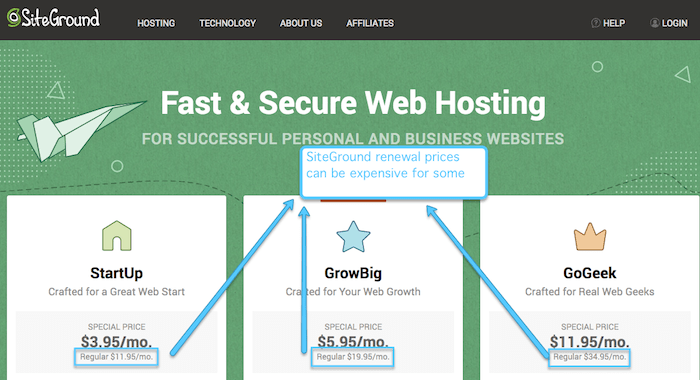
For many people, storage is a big factor when choosing a cheap web hosting plan and they panic if they don’t have unlimited webspace. Unless you are planning to create a massive website with hundreds of images and videos you won’t need a lot of space.
For example, take the website you are on right now, it has thousands of pages and files and it takes less than 4 GB. Plus as we’ll see later on, unlimited storage isn’t always that unlimited.
Most providers will offer 24-hour support by chat, email or even phone. Personally, I think good support is key and not all providers get it right. For example, I’ve had bad experiences with EIG products like Bluehost and iPage, whereas I am happy with InMotion’s, DreamHost’s and SiteGround’s support.
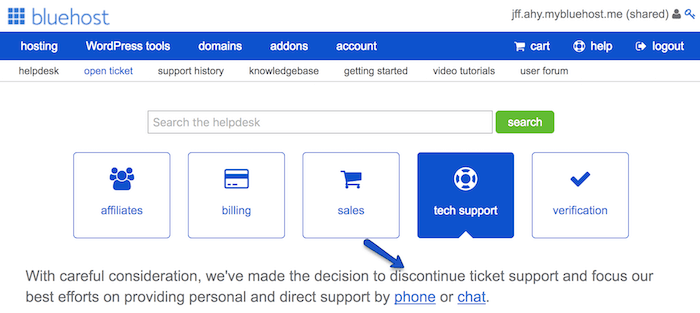
If your project grows, will your web hosting provider be able to scale things up for you? You should double-check what other types of hosting they can offer: VPS, dedicated servers, cloud hosting, CDN, etc.
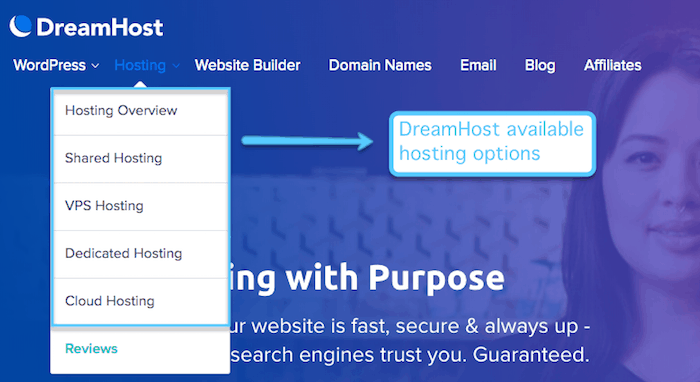
Many web hosting providers like to call one of their plans Unlimited. But being 100% honest, virtually all cheap web hosting services have some sort of limitation. Let me walk you through the most common ones:
- Storage: The amount of webspace that your hosting account has available can be limited. 10 or 20 GB of storage should be enough for most shared web hosting users.
- Bandwidth: Some cheap web hosting providers will cap the amount of traffic that your website can get. If you go over that, you’ll be asked to pay an extra fee or upgrade your hosting package to a more expensive one.
- Domains & Websites: It’s pretty common that the entry-level plan of a web hosting service is limited to 1 or 2 websites. This means that if you are planning to host more projects you’ll need to purchase a higher tier.
- Databases: Limiting the number of databases you can create is an indirect cap on the sites you’ll be able to host – e.g. for each WordPress site you’ll need at least 1 database. The size of the databases can also be limited (e.g. with Bluehost they need to be smaller than 3 GB).
- Email accounts: Some web hosts limit the email accounts that you’ll be able to create and the maximum size that each email account can have. Normally, higher plans offer unlimited email accounts.
- Inodes: You can understand the inodes as the total number of files that you have on your web hosting account. For example, even if HostGator says that they offer unlimited storage, this is not 100% true as all your files (and folders) combined should not total more than 250,000 – a sneaky way to offer (limited) unlimited plans.
- Performance: Things like RAM, CPU or concurrent processes are limited to ensure that (shared) web hosting accounts don’t consume too many server resources.
- Missing features: A shadier way to limit web hosting plans is not to offer certain basic features. For example, providers like iPage, HostGator or Bluehost offer limited backup options, but conveniently have a backup add-on you buy from them. Another stingy way to limit plans is by not offering free SSL certificates so users are pushed into purchasing one from the web hosting provider.
Typical Cheap Hosting Issues
In my experience, there are 4 areas that separate reliable cheap web hosting providers from the rest.
Performance
If you ask me, this is the most annoying trend among some low-cost web hosting providers. They offer poor loading speeds and/or critically lower uptime rates.
You don’t need a computer engineering degree to realize that a slow server will crash your site’s speed.
Having a slow average page load time is closely related to poorer user engagement metrics (e.g. conversions or bounce rates) and lower SEO rankings. Generally speaking, experts recommend that your site should load under 3 seconds.
And while there are a few things you can do yourself to fix a slow website or make WordPress faster, the speed of your web host will have the biggest impact om the speed of your website.
You can see the best performing web hosts for speed in our latest tests in the chart below:
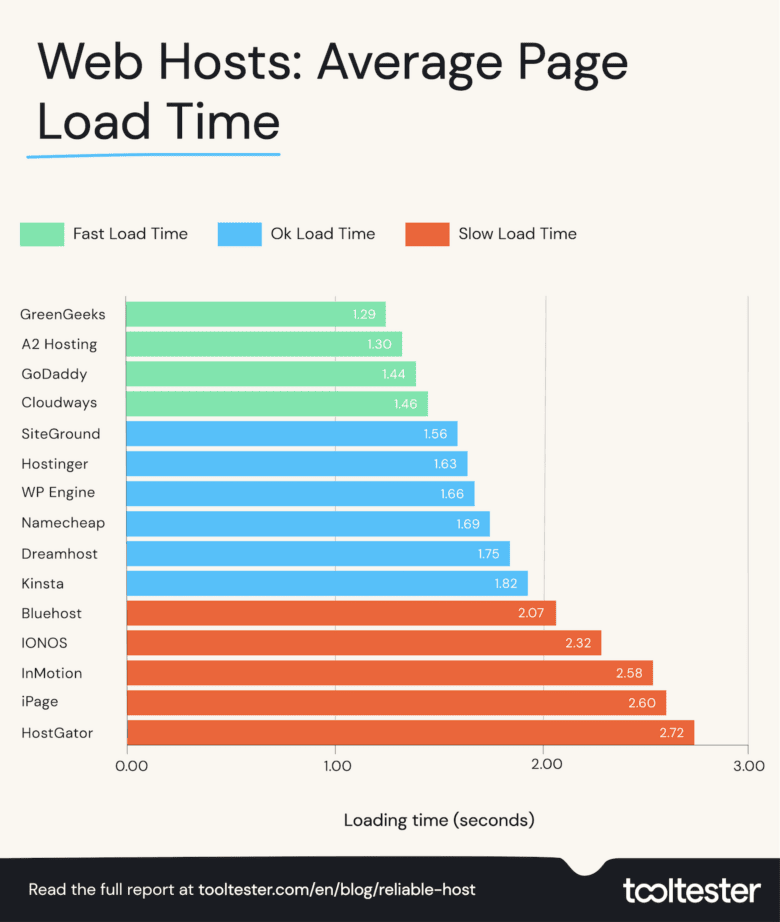
You can also see how these speeds have varied across the last three years of testing in the table below:
| 2020 | 2021 | 2022 | |
|---|---|---|---|
| Page Load Time in Seconds | |||
| GreenGeeks | 2.39 | 1.56 | 1.29 |
| A2 Hosting | 3.15 | 2.01 | 1.30 |
| GoDaddy | 3.40 | 1.94 | 1.44 |
| Cloudways | 2.32 | 1.73 | 1.46 |
| SiteGround | 2.14 | 1.54 | 1.56 |
| Hostinger | 4.19 | 1.61 | 1.63 |
| WP Engine | 2.21 | 1.65 | 1.66 |
| Namecheap | – | 1.60 | 1.69 |
| Dreamhost | 3.28 | 1.84 | 1.75 |
| Kinsta | 2.98 | 1.77 | 1.82 |
| Bluehost | 3.07 | 2.87 | 2.07 |
| IONOS | – | 1.95 | 2.32 |
| InMotion | 4.36 | 2.75 | 2.58 |
| iPage | 4.19 | 2.76 | 2.60 |
| HostGator | 3.77 | 2.78 | 2.72 |
Another common issue is hosting services interruptions. Some cheap web hosts (and all free web hosting services), have constant service cutoffs (e.g. for maintenance reasons) and this can be a massive problem.
For example, let’s assume that you have an online store and your server goes down for 1 or 2 hours during Black Friday, I am sure you won’t be happy about this.
Businesses relying on their online traffic should aim for at least a 99.95% uptime rate – in other words, your yearly interruptions should be less than 4 hours.
You can see the best performing web hosts for uptime in our latest tests in the chart below:
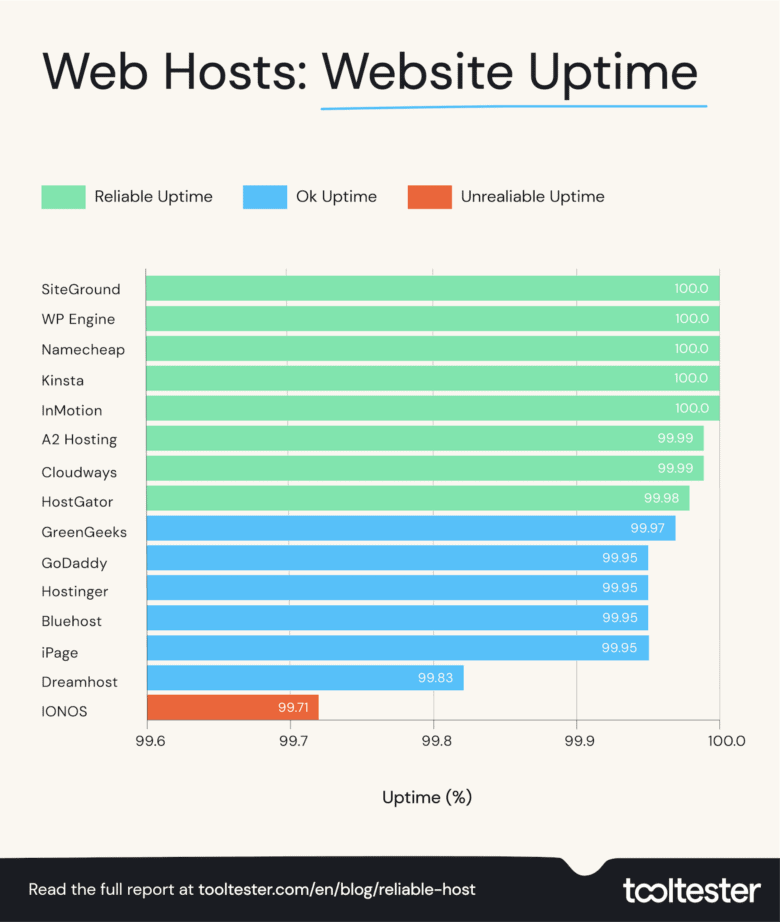
And again, you can see how these uptime results have varied over the last three years in the table below:
| 2020 | 2021 | 2022 | |
|---|---|---|---|
| Uptime % | |||
| SiteGround | 99.97 | 100 | 100 |
| WP Engine | 99.99 | 99.99 | 100 |
| Namecheap | – | 100 | 100 |
| Kinsta | 100 | 100 | 100 |
| InMotion | 99.73 | 99.95 | 100 |
| A2 Hosting | 99.99 | 99.98 | 99.99 |
| Cloudways | 100 | 100 | 99.99 |
| HostGator | 99.91 | 99.99 | 99.98 |
| GreenGeeks | 99.98 | 99.98 | 99.97 |
| GoDaddy | 99.90 | 99.96 | 99.95 |
| Hostinger | 99.48 | 99.92 | 99.95 |
| Bluehost | 99.96 | 99.99 | 99.95 |
| iPage | 98.45 | 99.85 | 99.95 |
| Dreamhost | 99.99 | 99.96 | 99.83 |
| IONOS | – | 99.93 | 99.71 |
In my experience, there are 2 main reasons why (a few) cheap web hosting providers offer poor performance:
- They use old hardware (e.g. servers) to cut down costs
- They overload their servers with too many clients
I would suggest that you check SiteGround and A2 Hosting if you want a top-performing shared web hosting service. Check out our web host speed and uptime tests for more information.
Customer Support
To me, reliable and responsive support is crucial to (seriously) consider a web hosting provider. Most of the time you don’t need to contact a support agent, but when you do (and you will) often your site is in deep trouble (e.g. not loading). So having a responsive customer care team can save you loads of headaches and money.
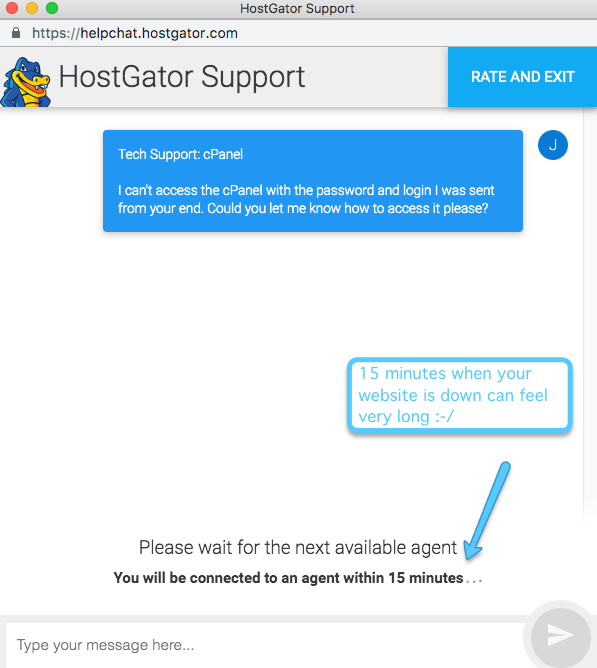
Sadly, most cheap web hosting providers don’t excel here. In my experience the issues are:
- They take ages to be available for you after you’ve requested their help
- They can’t solve your issue, or even worse, they create new problems when trying to fix the original one.
My experience with customer support tells me that InMotion, DreamHost and SiteGround are more reliable than average.
Hidden Fees & Upsells
Some low-cost web hosting services get you onboard for a very low price, I even think some may not make money with your first payment. But their ultimate goal is to trick you to get one of their pricey upsells (e.g. security add-ons) or charge you with fees you were not expecting (e.g. for backups).
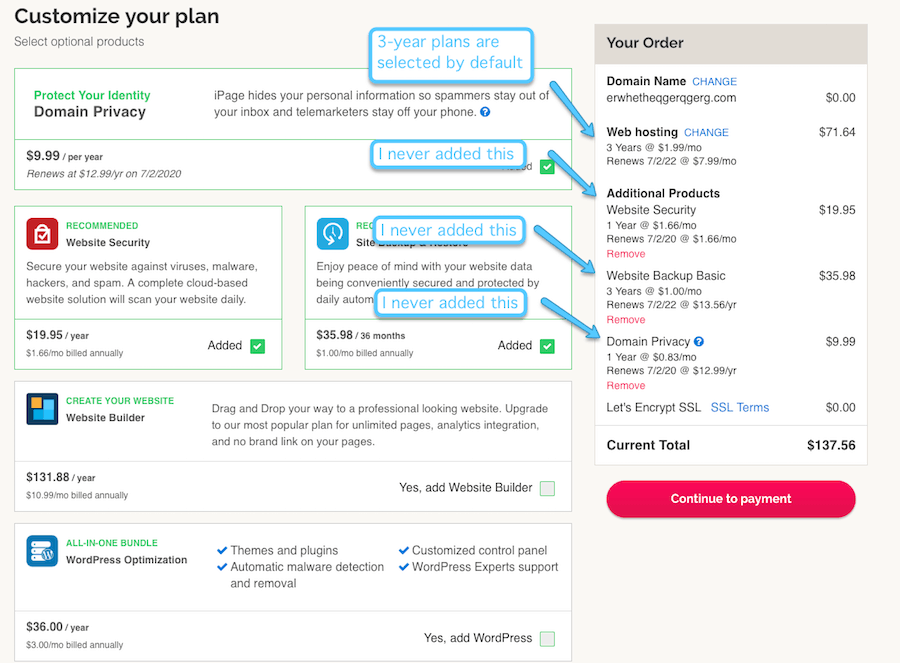
iPage’s tricky checkout
Another sneaky tactic is to always offer really long contracts (e.g. 36-months) by default during the checkout. On top of that, unnecessary add-ons (e.g. domain privacy) may be pushed into your shopping cart while purchasing a web hosting plan.
Missing Features
It’s not unusual to come across some cheap web hosting providers that don’t offer some basic features. For example, providers like HostGator or InMotion Hosting don’t offer a (free) system to keep backups – make sure to factor in the backup add-on price when considering these providers.
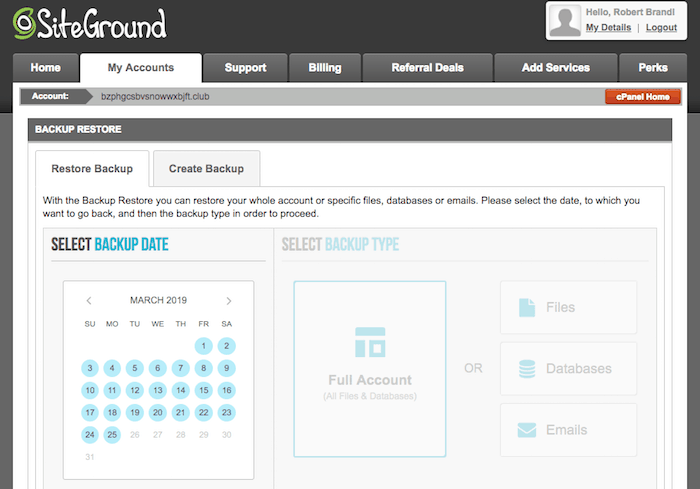
SiteGround’s on-demand backup system is unique among cheap web hosting services
Larger site owners will require advanced features like built-in caching solutions, staging areas or pre-installed Git repositories. Be aware that these are not offered for every web hosting service, so double-check the features you need before you commit with one.
Cheap Web Hosting, which one is right for you?
I’ve covered a lot in this guide and hopefully, you have a better idea about what affordable web hosting provider you should go for. Let me, however, highlight a couple of aspects.
As we’ve seen, several web hosts come with high reduced first-term fees, but prices can even triple at renewal. Some providers only offer basic features like SSL certificates as paid add-ons. Finally, be aware of hidden costs (e.g. if you need to pay to restore a backup).
But price should not be the only factor to consider when choosing a web hosting service. Personally, I pay close attention to their performance (uptime & speed), the quality of their customer support and available features like built-in caching solutions, staging areas or reliable backups.
And now let me tell you about what provider I’d use for several situations:
- The best overall web hosting provider is SiteGround, offering great performance, support and useful hosting features (e.g. staging areas), but it’s not the cheapest hosting service.
- DreamHost is a top-performing web hosting provider at a good price; it offers the best value for your money.
- Cloudways is the way to go if you need a flexible cloud hosting that performs well.
- A2 Hosting and SiteGround come with good value WordPress optimized servers and convenient features for WordPress developers and site owners. Read more about the best cheap WordPress hosting.
- If you are looking for a Windows-based server, check out GoDaddy and A2 Hosting.
- The best support is offered by InMotion Hosting, DreamHost and SiteGround.
I hope you found this article useful and I was able to answer some of your questions. However, if you still need help choosing a cheap web hosting, please leave a comment.
We keep our content up to date
18 Nov 2024 - New ranking and general update
11 Jan 2023 - Added new DreamHost support hours
13 Dec 2022 - Badges added
01 Jun 2022 - Smaller updates
15 Mar 2022 - GoDaddy updated its plans' limitations
13 Dec 2021 - Namecheap video review
25 Nov 2021 - GreenGeeks video-review added
21 Oct 2021 - InMotion Hosting Core plan added
11 Oct 2021 - Namecheap tested and reviewed
17 Sep 2021 - New ranking after performance tests
14 Sep 2021 – New performance and general update for DreamHost, GreenGeeks & A2 hosting
10 Sep 2021 – New performance and general update for DreamHost, InMotion Hosting and HostGator
14 Apr 2021 – SiteGround limits the sites you can have in each plan
06 Apr 2021 – A2 Hosting doesn't offer Windows-based hosting plans
08 Feb 2021 – Video reviews added
02 Sep 2019 – Initial article
THE BEHIND THE SCENES OF THIS BLOG
This article has been written and researched following a precise methodology.
Our methodology












